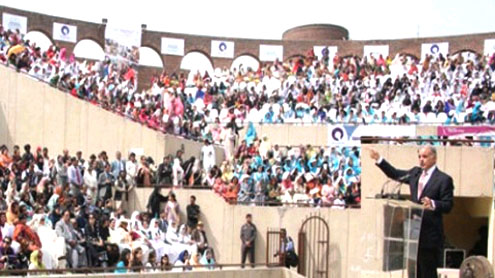 EDITORIAL (October 06 2010): A high-level meeting presided over by President Asif Ali Zardari at Bilawal House in Karachi discussed the imposition of a one-time flood tax on valuable urban property as a means to generate additional resources for rehabilitation and reconstruction efforts of the flood-affected areas.The meeting concluded that consultations with the coalition partners in the Sindh government on the levy of this tax must be carried out prior to its levy. Fauzia Wahab, allegedly, misinformed the media and presented the levy of the tax as a fait accompli, which led to a subsequent clarification by the Sindh government.
EDITORIAL (October 06 2010): A high-level meeting presided over by President Asif Ali Zardari at Bilawal House in Karachi discussed the imposition of a one-time flood tax on valuable urban property as a means to generate additional resources for rehabilitation and reconstruction efforts of the flood-affected areas.The meeting concluded that consultations with the coalition partners in the Sindh government on the levy of this tax must be carried out prior to its levy. Fauzia Wahab, allegedly, misinformed the media and presented the levy of the tax as a fait accompli, which led to a subsequent clarification by the Sindh government.
Meanwhile, the MQM has strongly opposed the levy of the one-time flood tax, a stance supported by Business Recorder on two counts. First and foremost, urban property tax is a provincial subject and democratic norms suggest that it must be debated and subsequently approved in the provincial assembly. That is precisely what was decided in the meeting at Bilawal House and therefore, the decision merits high commendation indeed.While without doubt, the PPP has a very strong base in Sindh which accounts for the President and the Prime Minister chairing many a provincial cabinet meeting on several occasions, an occurrence that has never taken place in the other three provinces in spite of the fact that the PPP is in coalition in the other three provinces as well, yet it is appropriate for those who are part of the national parliament to discuss a national flood tax instead of a province-specific tax.
And second, it is likely that the flood tax, if imposed by the Sindh government, would be successfully challenged in the courts as revenue collected from it would be diverted to the flood-affected districts as opposed to the district from which it is collected, as required by law as any tax on property belongs to the local government.The government must bear in mind that the levy of a national carbon tax was similarly successfully challenged in the courts as its revenue was to be earmarked not for environment protection, but for budgetary support. And while in the case of the carbon tax a renaming did work, yet in the case of a Sindh-specific flood tax, this may not be possible especially considering that the governments of Punjab and Khyber-Pakhtunkhwa have already indicated their refusal to impose a flood tax.
These two provinces maintain that the federal government must slash its wasteful expenditure, both current and development, and raise revenue by ending tax exemptions on the rich and influential as a means to generate additional revenue to meet the rehabilitation and reconstruction needs of the flood-hit areas. The two provincial governments have also indicated that the people of Pakistan, including industrialists and those with valuable urban property have already made massive donations to the relief efforts of the flood victims.However, their medium of support was through NGOs and not through the government due to a trust deficit. In this context it is disturbing that the Prime Minister has still not reduced his 70 plus cabinet and advisors with the status of a federal minister more than two months after the extent of the actual devastation wrought by the floods was first revealed.
The MQM, however, added a third reason: the industrial sector is already suffering from heavy taxes and enhanced load shedding and any additional tax on its immovable property would be the last straw on the camel’s back, which would have negative repercussions on national productivity, as well as employment levels.The MQM leadership has also stated that the tax would also hurt the salaried people. One cannot argue against such logic and one would hope that the federal government takes cognisance of issues that surround its governing capacity, as well as its focus on reforming the very tax system that has been under considerable attack, not only domestically but also internationally – Brecorder











